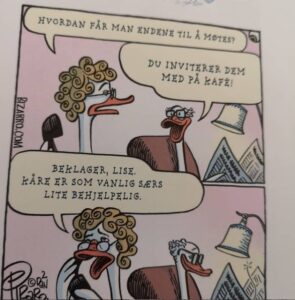About Me
Suzanne Berget
She has written around 4000 news pieces, articles, previews and reviews about video games, and been published in 13 countries, including China.
Two of her short stories have been published in the literary magazines Bøygen and Kamilla.
Let Slip the Beasts is her first novel.
Projects
Suzanne has done everything from writing and translating operation and maintenance manuals for offshore equipment, to overseeing the translation, type setting, layout and publishing of the Norwegian edition of Dragon Ball. She's the former editor in chief of Gamereactor Norway, and the current editor in chief of Spillbart.
Spillbart
Like LET SLIP THE BEASTS, Spillbart is a passion project. I love video games and I love writing about video games. At Spillbart I can write about whatever I want when I want. There is no management hassling me about dwindling visitor numbers, there are no quotas to be filled, there is no comment section where my skills as a writer and gamer are questioned because I happen to be a woman, there are no ads, there are no threats of being fired for not producing enough content, no working through weekends, Christmas and Easter. There is no money in this. Spillbart is a safe haven (unless you’re a terrible person with terrible opinions).
Granted, with Spillbart being entirely hobby based, we don’t necessarily post stuff as often as other sites, but we make up for this by getting drunk on stream and talking about games and having one of the best Instagram accounts this world has ever seen. It’s mostly butts. Who am I kidding, it’s ALL butts.
While being editor in chief of Spillbart I’ve been invited to sit on the press jury for Spillprisen 2020, which was a HUGE honour and a really fun experience, as well being a moderator on a panel on Gender and New Initiatives in Gaming, organized by Institut français de Norvège.
As a games journalist my focus has been on inclusion and diversity and trying to shed some light on the huge imbalances that exist in the games industry. As an editor in chief, especially for Gamereactor Norway, I tried to be more hands-on and actively shift that imbalance in my tiny little corner of the industry. This has meant going on national TV to talk about games, participating in panels and debates, giving talks for Women in Games and guest lectures for potential new game developers and journalists at University of Oslo and Kristiania University College, as well as hiring more women as freelancers. That turned out be a lot harder than I thought, for a myriad of reasons.
Dragon Ball
In 2015, while I was working at Outland - Norway’s premier SFF bookstore - I was asked if I wanted to be a part of their Dragon Ball project, translating and publishing the Dragon Ball series in Norwegian. I of course said yes, I mean, who wouldn’t? Initially I was only supposed to come on board as a translator, what with my Bachelor’s Degree in translation and technical language, but as the project progressed it snowballed and I ended up as editor in chief, overseeing a staff of 4-5 others.
What followed was roughly nine months of grueling work; 15 hour days, overseeing translations, editing, proofreading, typesetting, putting it all together in InDesign - learning InDesign and then subsequently learning how to make scripts for InDesign to trick it into accepting a RtL format - coordinating with the printer in Sweden, more editing, more proofreading, designing a cover, building and maintaining a good relationship with the Japanese publisher Shueisha, getting everything approved by Shueisha, then finally publishing and shipping the damn thing.
After the first volume shipped, the production was moved to Bergen and I was let go as editor in chief. What is now known as Outland Forlag are currently shipping the last volume in the Dragon Ball series, and have also acquired the rights to My Hero Academia.
Gyldendal
In 2019 I started freelancing for Gyldendal, one of Norway’s most prominent publishing houses. Here I translate guest comics for the widely popular comic strip Nemi. These guest comics include Sarah’s Scribbles, In your Face Cake, Tom Gauld and Bizarro.
It’s quite challenging work, because jokes don’t always translate that well. This is especially true for Bizarro, which relies heavily on puns and homonyms. There’s also the space constraint to consider. You can’t really explain a joke in 140 characters or less, you either translate it directly or rewrite it completely. If you rewrite it completely, you also have to make sure it fits with the visuals. Like I said, it’s challenging, but also really fun!

This is probably one of my favorite examples of how a complete rewrite sometimes is very necessary. The original conversation went something like this:
“Harold, how do you get down off an elephant?”
“You don’t get down off an elephant, you get it off a goose.”
Here “down” means two wildly different things - a direction and the thing you stuff your jacket with - and none of them work in Norwegian in this context (ned, dun). I played around with “nedderdun” for awhile, but ultimately decided to go in a totally different direction with “endene”, which means either ends or ducks, depending on context, so the new conversation is as follows:
“Harold, how do you make ends meet?”
“You invite them to a café!”